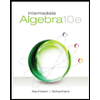A lottery has a grand prize of $300,000, four runner-up prizes of $37,500 each, ten third-place prizes of $6000 each, and twenty-two consolation prizes of $3000 each. If 1,200,000 tickets are sold for $1 each and the probability of any one ticket winning is the same as that of any other ticke winning, find the expected net winnings on a $1 ticket. (Round your answe to two decimal places.) $ 52 x please answer in typing
A lottery has a grand prize of $300,000, four runner-up prizes of $37,500 each, ten third-place prizes of $6000 each, and twenty-two consolation prizes of $3000 each. If 1,200,000 tickets are sold for $1 each and the probability of any one ticket winning is the same as that of any other ticke winning, find the expected net winnings on a $1 ticket. (Round your answe to two decimal places.) $ 52 x please answer in typing
Intermediate Algebra
10th Edition
ISBN:9781285195728
Author:Jerome E. Kaufmann, Karen L. Schwitters
Publisher:Jerome E. Kaufmann, Karen L. Schwitters
Chapter2: Equations, Inequalities, And Problem Solving
Section2.3: Equations Involving Decimals And Problem Solving
Problem 65PS
Related questions
Question

Transcribed Image Text:A lottery has a grand prize of $300,000, four runner-up prizes of $37,500
each, ten third-place prizes of $6000 each, and twenty-two consolation
prizes of $3000 each. If 1,200,000 tickets are sold for $1 each and the
probability of any one ticket winning is the same as that of any other ticket
winning, find the expected net winnings on a $1 ticket. (Round your answer
to two decimal places.)
$52
x
please answer in typing
format
Expert Solution
This question has been solved!
Explore an expertly crafted, step-by-step solution for a thorough understanding of key concepts.
Step by step
Solved in 4 steps with 3 images

Recommended textbooks for you

Intermediate Algebra
Algebra
ISBN:
9781285195728
Author:
Jerome E. Kaufmann, Karen L. Schwitters
Publisher:
Cengage Learning

Algebra for College Students
Algebra
ISBN:
9781285195780
Author:
Jerome E. Kaufmann, Karen L. Schwitters
Publisher:
Cengage Learning

Intermediate Algebra
Algebra
ISBN:
9781285195728
Author:
Jerome E. Kaufmann, Karen L. Schwitters
Publisher:
Cengage Learning

Algebra for College Students
Algebra
ISBN:
9781285195780
Author:
Jerome E. Kaufmann, Karen L. Schwitters
Publisher:
Cengage Learning